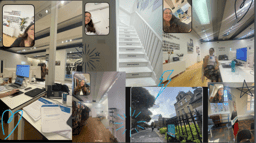What does leadership mean to you today?
I still stand by my belief that leadership is a process much like falling in love, it doesn’t happen instantly. It requires time, patience, and the ability to trust someone enough to give them space to build their faith in you. However, after my experience in the Laidlaw Program, I’ve come to realise that leadership is also about flexibility. Working with women from underprivileged backgrounds during my time at Smart Works, engaging with Coptic priests for my research, and even navigating differences with the people I traveled with, I saw firsthand how diverse perspectives can be. It is rare to find someone you align with completely on every fundamental belief or approach. True leadership, therefore, lies in adapting, not in compromising values, but in being open to different ways of thinking, working, and problem-solving. One trait that remains non-negotiable is kindness, but I now believe that flexibility is just as critical. If I had been too rigid, stuck in my own comfort zone, research methods, or preferred ways of working, I wouldn’t have grown as a leader, nor would I have been effective in guiding others. Leadership isn’t about enforcing one’s own methods; it’s about creating an environment where diverse voices are heard, respected, and integrated into a shared vision. A leader’s strength isn’t in unwavering certainty, but in the ability to adapt, learn, and evolve while staying true to their core values.
How have you developed as a leader (or: how did your leadership skills develop) over the past two years?
Over the past two years, my understanding of leadership has shifted significantly. I see it as a process of learning, adapting, and working with others rather than just directing them. Much of this change came from experiences like working with women at Smart Works, conducting research on Coptic refugees, and collaborating in academic and professional settings. I realised that leadership isn’t about having a fixed way of doing things, it requires flexibility. Every situation and every team is different, and a good leader needs to be able to adjust while still maintaining a sense of direction. I also learned that leadership isn’t just about confidence; it’s about listening and creating space for others. In many cases, stepping back and allowing others to contribute is just as important as stepping forward. At times, I had to acknowledge when I didn’t have the best approach and be open to new ideas. Another key takeaway has been the importance of balance, between decisiveness and adaptability, between guiding and listening, and between setting expectations and being understanding.
How does having completed this programme help you in the future?
The Laidlaw Programme came into my life at a time when I wasn’t entirely sure of my path. I applied without overthinking, just wanting to be honest about who I was. Getting in felt like a confirmation that I didn’t need to fit into a mold to succeed, I just needed to be myself.
I walked away from Laidlaw with more than just knowledge or experiences. I learned that what is meant for you will always find you. When I didn’t get into one of my preferred Leadership-in-Action (LiA) projects, I felt a bit disheartened. But I ended up at Smart Works, working on women’s development, something I’ve always been passionate about. I met women who were inspiring and kind, and I had an absolutely incredible summer overall because of them. It made me realise that rejections are often redirections toward something better, something that aligns with who you are at your core.
Beyond that, traveling through Europe, researching Coptic communities, and immersing myself in a world so different from my own was a privilege that changed me. It reinforced my passion for humanitarian work and taught me to navigate unfamiliar spaces with openness and adaptability. Engaging with people from different backgrounds, learning about their struggles and triumphs, and seeing the power of grassroots change firsthand deepened my sense of global citizenship. I now understand that leadership isn’t just about taking charg, it’s about building bridges, fostering empathy, and recognising the interconnectedness of our world.
Laidlaw has given me the confidence to step into global conversations with a broader, more informed perspective. I now see myself not just as a representative of my own background but as someone who can engage meaningfully across cultures, advocate for equity on an international scale, and contribute to solutions that transcend borders. The ability to listen deeply, communicate effectively, and appreciate diverse worldviews has become an integral part of how I approach both leadership and life.
Perhaps the most valuable lesson I’ve gained is the art of communication. Understanding how to frame my words to different audiences, how to truly listen, and how to ask the kind of questions that make people pause and think. Laidlaw didn’t just make me a better researcher or leader; it made me someone who is more curious, more resilient, and more prepared to embrace the unknown.

Please sign in
If you are a registered user on Laidlaw Scholars Network, please sign in